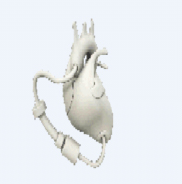
ISRO scientists make artificial heart
Materials and mechanisms used on Indian rockets have been tweaked by Indian Space Research Organisation (ISRO) to make a device which some say definitely a step towards the making of an “artificial heart”. The prototype has been successfully tested on animals. The ISRO team known for orbiting satellites and flying giant rockets to space, made this heart pump as a spin off technology development in the spare time.
Cardiologists are very excited with this development as it offers a longer lease of life to terminally ill patients since heart transplant still remain out of reach for most. The device called “Left Ventricle assist “, made of lightweight materials, contains a small electrical device weighing about 100 grams and powered by lithium Ion battery, which can pump 3-5litres of blood every minute using centrifugal pump technology, according to Kiran Kumar ISRO Chairman. Scientist at ISRO have perfected the functionality that assists the human heart to pump blood especially in case where the left ventricle, the most powerful of a human heart, starts to fail.
A collaboration between Dr Michael De Bakey, Dr George of NASA and MicroMed Technology resulted in lifesaving heart pump for patients awaiting transplants. The MicroMed DeBakey Ventricular assist Device (VAD) functions as a “bridge to heart transplant” by pumping blood through out the body to keep critically ill patients alive until a donor heart is available. Weighing less than 4 ounces and measuring 1” x 3 “, the pump is approximately one-tenth the size of other currently marketed pulsatile VADs. This is less invasive and ideal for younger adults and children. As the pump size is small, less than 5 percent of the patients implanted developed device related infections and can operate 8-hour batteries, giving patients the mobility to do normal everyday activities.
